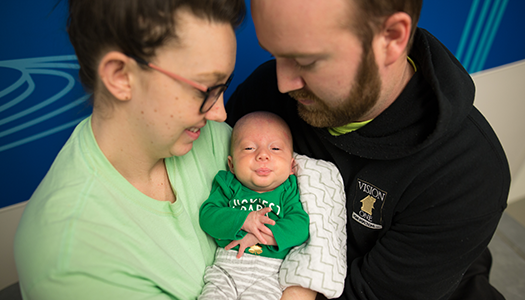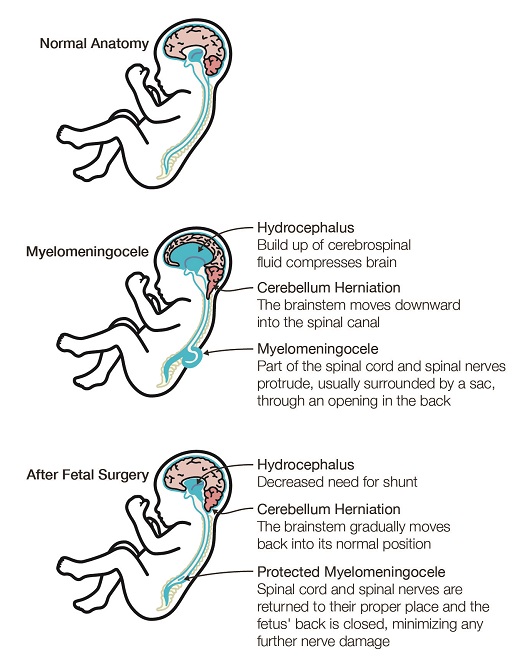Spina bifida, which means “open spine,” occurs when an unborn baby’s neural tube does not close properly. This opening can happen anywhere along the spine. It exposes a portion of the spinal cord and nerves, leaving them susceptible to damage.
Spina Bifida Treatment: Why Choose Us?
WashU Medicine doctors at the Fetal Care Center, the only center of its kind in the St. Louis region, perform fetal surgery to treat myelomeningocele (MMC), a severe form of spina bifida. Not all babies with spina bifida require this type of surgery. Our doctors assess your unborn baby’s specific situation to determine appropriate treatment.
 Jackson, underwent open fetal myelomeningocele repair for spina bifida at 25-weeks in utero.
Jackson, underwent open fetal myelomeningocele repair for spina bifida at 25-weeks in utero.
If needed, we perform fetal surgery to close the spinal opening while your unborn baby is still in the womb (in utero). We offer both open and fetoscopic in utero repair of MMC, performed by an experienced team of fetal surgeons. Only select fetal centers in the nation have a surgical team with the skill set to perform this complex procedure.
The Fetal Care Center partners with WashU Medicine pediatric specialists at St. Louis Children’s Hospital’s Spina Bifida Clinic to provide ongoing care for children born with spina bifida. This seamless collaboration of pediatric and maternal specialists happens all on one medical campus.
About Spina Bifida
Spina bifida affects the development of a baby’s brain, spine, spinal cord, and meninges, the tissue that covers and protects the brain and spinal cord. There are two main types of open spina bifida:
There are two main types of spina bifida:
- Myelomeningocele: This is the most common, survivable spinal cord defect. Early in fetal development, the neural tube fails to completely close, leaving an opening through which part of the spinal cord and associated nerves are exposed. Babies born with myelomeningocele may experience:
- Paralysis or muscle weakness
- Difficulties with movements, especially walking
- Bladder and bowel problems
- Hydrocephalus, excess fluid in the brain
- Meningocele: A fluid-filled sac that does not contain the spinal cord or nerves protrudes outside an unborn baby’s back. Babies born with meningocele usually experience little, if any, nerve damage. However, they may have bladder and bowel challenges.

Causes of Spina Bifida
While there is no definitive cause of spina bifida, certain factors increase risk, including:
- Genetics: If you, your partner, or one of your children has spina bifida, there is about a 4% chance of having another baby with a neural tube defect. Our genetic counselors can help you understand your future risk of having another child with spina bifida.
- Vitamin deficiency: Women who are low on folic acid, a B vitamin, before and during pregnancy are more likely to have a baby with spina bifida. If you’re trying to conceive, aim for 400 to 600 micrograms of folic acid every day.
- Ethnicity: Neural tube defects are more common among white and Hispanic patients.
- Gender: Neural tube defects occur five times more often in girls than boys.
Diagnosing Spina Bifida
To determine how to best care for your baby, we’ll do many tests to understand their condition, the severity of the defect, and any associated structural or genetic issues. This helps us determine the best course of care, including whether you would be able to safely undergo fetal surgery. These tests will include:
- Comprehensive, high-resolution ultrasound exam
- Ultrafast fetal MRI
You will meet with high-risk pregnancy care doctors, also referred to as maternal-fetal medicine specialists, who specialize in treating babies before they are born. If fetal surgery might help and you are interested in this care option, we’ll do more tests such as:
- Fetal echocardiogram
- Amniocentesis (if one has not already been done)
We perform a large number of high-risk pregnancy tests every year. This volume gives our team the skill set to detect spina bifida early. Throughout pregnancy, you undergo regular ultrasounds with a maternal-fetal medicine specialist to monitor your unborn baby’s development. Learn more about high-risk pregnancy tests.
Treating Spina Bifida
Treatment options for spina bifida depend on the severity of your unborn baby’s condition. These options include:
- Fetal surgery: Unborn babies with the most severe form of spina bifida, myelomeningocele, may benefit from fetal surgery to close the spinal opening. Fetal surgical repair of MMC has been shown to decrease rates of hydrocephalus, reverse hindbrain herniation, and improve lower-extremity motor function. WashU Medicine experts are among a select few in the country, and the only ones in the St. Louis region, with the skill set and comprehensive team to perform this complex surgical procedure, offering both an open and fetoscopic approach to repair. Learn more about fetal surgery for spina bifida.
- Pediatric surgery (after delivery): WashU Medicine pediatric neurosurgeons at St. Louis Children’s Hospital can perform surgery to close the spinal opening after a baby is born. Learn more about pediatric spina bifida treatment at St. Louis Children’s Hospital.
Contact Us
To make an appointment with a WashU Medicine fetal care specialist at the Women & Infants Center, call 866-867-3627.